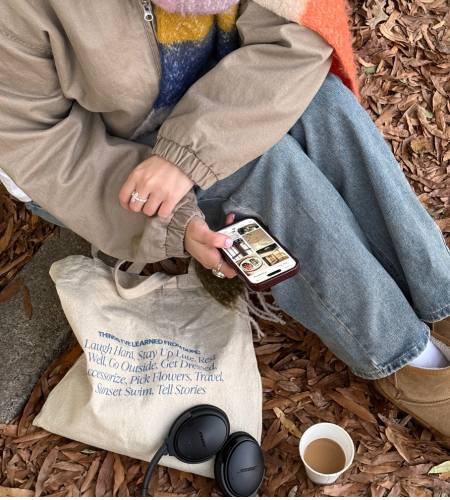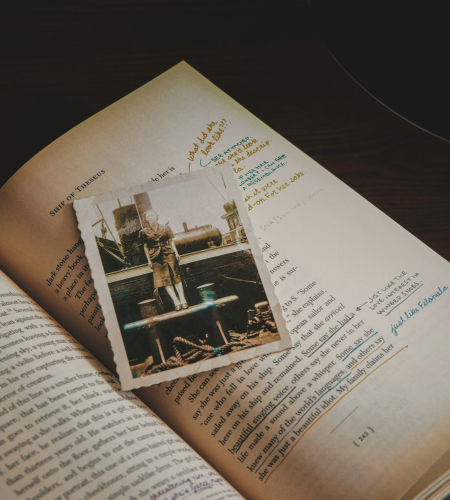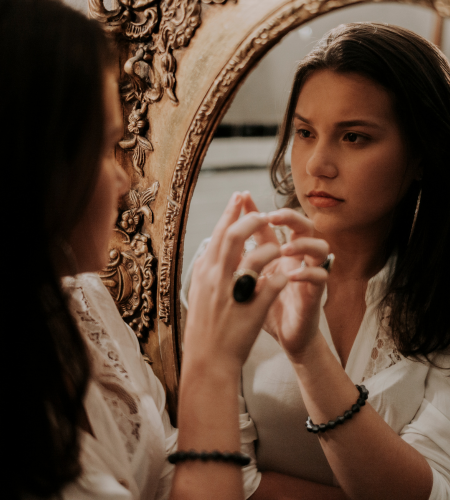
Have you ever caught yourself thinking, Why don’t I feel like… me?
That feeling—the sense that something is off, like you’re going through the motions but not fully there—isn’t random. It didn’t just appear out of nowhere. It started a long time ago.
From the moment we’re born, we start picking up unspoken rules about what it takes to be accepted, loved, and safe. We learn which parts of ourselves are welcome and which ones… maybe not so much. So, we adjust. We soften parts of ourselves, hide certain feelings, and mold who we are to fit the world around us.
But over time, those little adjustments add up. And one day, you wake up realizing you don’t quite recognize yourself anymore.
Let’s break down why this happens, how it’s shaped your thoughts and choices, and—most importantly—what you can do to reconnect with the real you.

The Adaptive Self vs. The Authentic Self
We all have two sides to us—two versions of who we are.


And here’s the thing—adapting isn’t bad. In fact, it’s necessary! It helps us navigate relationships, work, and daily life. The problem comes when the Adaptive Self takes over completely, drowning out what you actually want, need, and feel.
If you’ve ever ignored your gut feeling, said yes when you really meant no, or shaped yourself to match what others expected—your Adaptive Self was in charge. And over time, if we’re not careful, we can lose sight of who we really are.
So, how does this happen? And more importantly, how do we start undoing it?
How We Get Disconnected from Our Authentic Self
1. We Are Born Authentic—Then We Learn to Adapt
Think about little kids—they don’t hold back. They cry when they’re upset, laugh when something is funny, and run toward whatever excites them. They don’t second-guess their feelings or wonder if they’re too much. They just are.
But as we grow, we start to notice something: not everything we do is met with acceptance.
Maybe you were told to “calm down” when you got too excited. Or learned that speaking up led to criticism instead of praise. Maybe showing emotions made people uncomfortable, or standing up for yourself caused conflict.
Without even realizing it, your subconscious started keeping track—what parts of you were welcomed? And what parts needed to be toned down, hidden, or changed to keep the peace?
This is how we start shifting from our Authentic Self to our Adaptive Self. It’s not a conscious choice. It’s our mind’s way of making sure we stay loved, accepted, and safe.
The problem? Over time, we forget what was real and what was learned. And before we know it, we’re living a version of ourselves shaped more by others than by our own truth.
2. The Role of Conditioning: Love, Approval & Survival
Our brain’s number one job? Keep us safe. And as children, safety isn’t just about food and shelter—it’s about connection.
We need love, approval, and belonging to survive, so we naturally start shaping ourselves to fit in. But what does that actually look like?
- Parental Expectations – Maybe you were praised for being the “good” child, staying quiet, or achieving certain goals. You learned that approval came with conditions.
- Society & Culture – From a young age, we absorb messages about what makes someone “worthy” based on gender roles, beauty standards, and success.
- School & Authority – Creativity and emotions often take a backseat to following rules, getting good grades, and being “practical.”
- Peer Influence – We all want to belong. So we pick up on what’s acceptable in our social circles—how to act, what to say, what to hide—to avoid rejection.
At first, these adjustments feel small—like just “going with the flow.” But over time, we start believing these outside expectations define who we are.
And that’s where we get stuck. Because if we’ve spent years shaping ourselves to be who we think we’re supposed to be… how do we even know who we really are anymore?
3. The Meaning We Attach to Experiences
It’s not just what happens to us that shapes us—it’s the meaning our subconscious attaches to it.
As kids, we’re constantly trying to make sense of the world. But because our brains aren’t fully developed yet, we don’t analyze things logically. Instead, we absorb experiences and form beliefs based on emotion.
Here’s how that plays out:
- A child who gets praised only when they achieve might believe: “I have to succeed to be worthy.”
- A child who’s told they’re “too sensitive” may think: “My feelings are a problem.”
- A child whose needs are ignored might conclude: “What I want doesn’t matter.”
These beliefs don’t just fade away—they become part of our subconscious programming, running in the background of our lives like an invisible script.
Fast forward to adulthood, and that same programming still influences our choices, relationships, and self-worth—without us even realizing it.

4. How This Plays Out in Adulthood
The subconscious mind craves consistency. Once it forms a belief, it works hard to prove that belief true—whether or not it actually benefits you. That’s why the patterns you learned in childhood don’t just disappear. Instead, they keep showing up in your adult life, shaping your decisions, relationships, and even your sense of self.
Here’s how:
1. Relationships: You Seek What Feels Familiar
If you grew up feeling like love had to be earned—through being perfect, helpful, or agreeable—you might find yourself in relationships where you overextend yourself, suppress your needs, or tolerate poor treatment. Even if a part of you knows you deserve better, your subconscious seeks what feels safe and familiar.
For example:
- You may stay in relationships where you feel unappreciated because deep down, you equate love with self-sacrifice.
- You might avoid speaking up about your feelings because you once learned that expressing emotions led to rejection or conflict.
2. Work & Achievement: You Tie Your Worth to Productivity
If your childhood praise revolved around accomplishments—good grades, achievements, being “the responsible one”—your subconscious may have linked your self-worth to external success. As an adult, this can lead to:
- Overworking yourself to prove your value.
- Feeling guilty when resting or prioritizing your needs.
- Struggling with imposter syndrome, fearing that if you slow down, you’ll lose the validation you’ve always depended on.
3. Boundaries: You Fear Letting People Down
If setting boundaries as a child led to guilt, punishment, or withdrawal of affection, your subconscious may now associate boundaries with danger—the risk of rejection, disapproval, or conflict. As an adult, this can look like:
- Saying “yes” when you really mean “no.”
- Avoiding difficult conversations because you fear upsetting someone.
- Feeling responsible for how others feel, even at your own expense.
4. Self-Expression: You Struggle to Know What You Want
If you spent years adapting to what others expected—whether it was being the “good child,” the “strong one,” or the “peacemaker”—you may have lost touch with your own authentic desires. You might:
- Feel disconnected from your own preferences, passions, or dreams.
- Second-guess your decisions, always looking for outside validation.
- Feel like you’re living a life that looks good on the outside but doesn’t truly fulfill you.
The Bottom Line
The subconscious mind isn’t trying to make you unhappy—it’s just following the rules it learned early on. But if those rules are keeping you stuck, disconnected, or unfulfilled, it’s time to rewrite them.
And the good news? That’s absolutely possible.

5. The Longer We Stay Unconscious to It, the More Disconnected We Feel
The tricky thing about subconscious programming is that it doesn’t announce itself. It runs quietly in the background, shaping our choices without us even realizing it. And the longer we keep operating from these old patterns, the further we drift from our authentic selves.
At first, this disconnection might not be obvious. It can show up as:
- A nagging feeling that something is off, even if your life looks “fine” on the surface.
- Constant exhaustion—not just physically, but emotionally, like you're always performing instead of simply being.
- Struggling to make decisions because you’re unsure what you actually want versus what you think you should want.
- Feeling stuck in the same frustrating patterns, whether in relationships, work, or self-worth, without understanding why.
Over time, this disconnection can leave you feeling lost, unfulfilled, and frustrated—like you’re living someone else’s life. You might find yourself asking, Why do I feel this way? Why can’t I just be happy? But the real question isn’t why you feel this way—it’s whose rules you’ve been living by.
True fulfillment only happens when we start questioning the beliefs that shaped us. When we stop running on autopilot and get curious about where our thoughts, habits, and fears really come from, we begin to break free.
And that’s when the real change happens.
How to Start Reconnecting with Your Authentic Self
The good news? You don’t have to stay stuck in old patterns. The moment you become aware that you’ve been operating from conditioning—not your true self—you’ve already taken the first step toward change.
Here’s how you can start reconnecting with who you really are:




The more you practice these shifts, the closer you’ll feel to you. Reconnecting with your authentic self isn’t about becoming someone new—it’s about coming back to who you’ve been all along.
Final Thoughts
You were never truly lost—you’ve just been following an old survival blueprint, one that was designed to keep you safe, not fulfilled. But the moment you start questioning it, you open the door to something new.
You can rewrite the story. You can unlearn the patterns that keep you stuck. And the more you reconnect with your authentic self, the more ease, clarity, and fulfillment you’ll feel in your life and relationships.
If you’re ready to go deeper—beyond surface-level mindset work and straight to the root of these patterns—subconscious work can help. My 1:1 hypnotherapy sessions are designed to rewire the beliefs that keep you disconnected, so you can finally feel at home in you.
✨ Ready to break free from old programming and reconnect with your true self? Book a 1:1 session here.
Your authentic self has been waiting for you all along. 💛









+ view comments . . .
+
view comments . . .
-